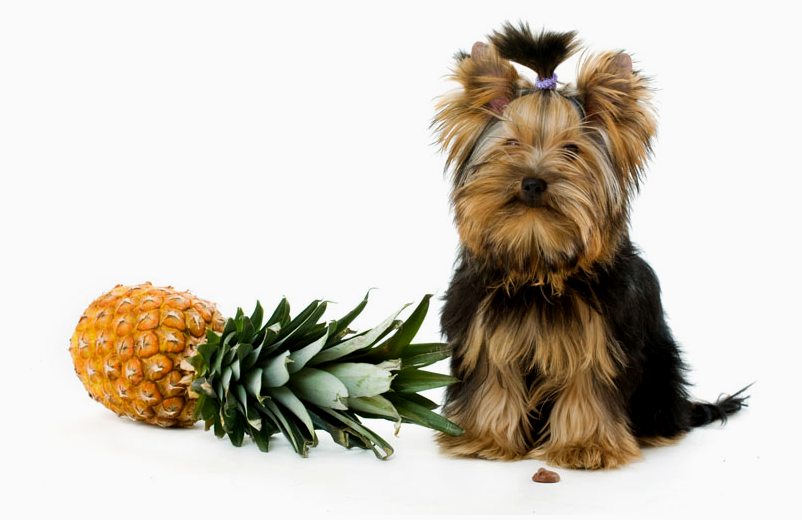If you’re thinking of sharing the joy of pineapple with your favorite four-legged friend you might be asking yourself… can dogs eat pineapple?
Pineapple itself is not toxic to dogs, but there are some important considerations to keep in mind if you’re thinking about giving your dog pineapple. Pineapple contains natural sugars and fiber, which can be safe for dogs in moderation. However, the core and skin of the pineapple can be tough and difficult for dogs to digest. Additionally, pineapple contains enzymes that might cause mouth and stomach irritation in some dogs.
Before giving your dog any human food, including pineapple, it’s crucial to consult with your veterinarian to ensure that it’s safe for your specific dog’s health and dietary needs. If you do decide to offer pineapple to your dog, make sure to remove the tough core and skin, and only give them small, well-diced pieces as an occasional treat.
Remember, moderation is key, and observing how your dog reacts to new foods is essential to ensure their well-being.

Is pineapple safe for dogs?
Yes, pineapple is generally safe for dogs to eat in small amounts as an occasional treat. It contains natural sugars and fiber, but it’s important to remove the tough core and skin before feeding it to your dog.
While pineapple itself is not toxic, some dogs might experience digestive upset or irritation due to the enzymes present in the fruit. Always consult your veterinarian before introducing new foods to your dog’s diet, and monitor their reaction to ensure their well-being.
Once you have read our handy guide on how to prepare a pineapple, you might be looking over at your furry pal and hoping to liven up their diet with a little tangy sweetness. Pineapple should always be shared, but can dogs eat pineapple?
Pineapple is packed full of vitamin C (repairs body tissue), and loads of other good stuff like riboflavin (helps absorb other nutrients), vitamin B6 (for brain development) and other minerals like copper, potassium, and iron.
How much pineapple can you feed to a dog?
We should always look to experts when asking questions like this. The American Kennel Club endorse pineapple as safe for dogs.
The amount of pineapple you can feed to your dog depends on their size, overall health, and individual tolerance to new foods. As a general guideline, you should offer pineapple in small, bite-sized pieces as a treat rather than a significant part of their diet.
For small dogs, a teaspoon or less of pineapple is typically sufficient, while larger dogs might be able to tolerate a tablespoon or two. It’s crucial to monitor your dog for any signs of digestive upset, such as vomiting or diarrhea, and to introduce pineapple gradually.
Overall, pineapple for dogs is a wonderful choice to help boost their diet!
How to Feed Pineapple to Dogs
Pineapple, as with many tropical fruits, is full of fiber and a significant amount of natural sugar.
So, it’s recommended to feed your dog pineapple only in small amounts at any one time.
It is perfect as a nutritious snack for dogs.
As with any new food, the first time you feed it to your dog you should keep a close eye on the dog’s behavior. If your dog shows any signs of an upset stomach or diarrhea, it probably means pineapple is a bad choice for your particular dog.
Can Dogs eat Pineapple Dried or Raw?
For full benefits, pineapple should always be eaten fresh, and raw. That includes your dog!
Dried pineapple can sometimes be hard for dogs to chew and digest, and loses a lot of the nutritional content.
So, if you want your dog to eat pineapple and get the best benefits, you should feed your dog raw and fresh pineapple in small amounts at a time!
FAQs on Pineapple for Dogs
Pineapple itself is not toxic to dogs. However, the core and skin of the pineapple can be tough and difficult for dogs to digest. Additionally, pineapple contains enzymes that might cause mouth and stomach irritation in some dogs.
The amount of pineapple you can feed to your dog depends on their size, overall health, and individual tolerance to new foods. As a general guideline, you should offer pineapple in small, bite-sized pieces as a treat rather than a significant part of their diet.
Your dog might be throwing up after eating pineapple due to the enzymes in the fruit, which can cause irritation in some dogs’ digestive systems. Also, the tough core and skin of pineapple can be difficult for dogs to digest. It’s possible that your dog might not tolerate pineapple well, leading to digestive upset. If vomiting persists or worsens, it’s important to consult a veterinarian to rule out any underlying issues and to ensure your dog’s health and well-being.
If your dog accidentally eats a small amount of pineapple, it’s unlikely to cause significant harm. In most cases, a small accidental ingestion of pineapple should not be a major concern. If your dog consumes a large amount or displays concerning symptoms such as vomiting or diarrhea, it’s best to contact your veterinarian for guidance and to ensure your dog’s well-being.



I love pineapples!
My dog loves pineapples too!
Thanks for sharing, Aubrey! Hopefully you gave them a nice little treat after reading this 🙂
An interesting discussion is worth comment. I think that you should write more on this topic, it might not be a taboo subject but generally people are not enough to speak on such topics. To the next. Cheers